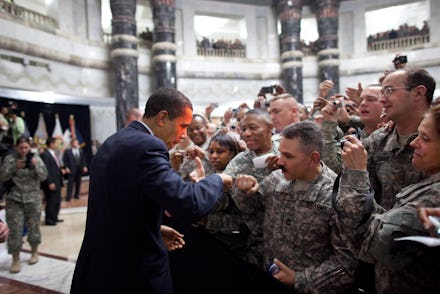You Should Be Fistbumping Instead of Handshaking, Doctors Say

The news: British researchers recently demonstrated that fistbumps aren't just way more awesome than boring old handshakes. They're actually much less likely to transmit infectious diseases.
The science: The Aberystwyth University study, to be published in the American Journal of Infection Control, found that a handshake transmits as much as 10 times more bacteria than its cooler cousin. Firmer ones allowed even more bacteria to escape onto the other hand. That's pretty disgusting. What's more, high fives didn't do so well either, being ultimately half as infectious as the handshakes.
Study lead Dr. Dave Whitworth says that public health professionals should take the results seriously. He explained the Independent that "People rarely think about the health implications of shaking hands. But if the general public could be encouraged to fist bump, there is a genuine potential to reduce the spread of infectious diseases."
Basically, anything that reduces the length and skin area of hand-to-hand contact reduces the transmission of disease. Thus a solid, lengthy handshake — exactly the kind recommended for a good first impression — is the worst of all options. It could very well expose you to a preventable illness; the CDC officially estimates that up to 80% of all infections are transmitted via the hands.
More science: This study was inspired by another published in JAMA that called for banning handshakes in hospitals and recommended they be replaced by alternatives that avoid person-to-person contact entirely. So if your doctor starts greeting you with a bow or Namaste, it's probably for health reasons.
To put this in a visual context, a similar study from 2013 in The Journal of Hospital Infection took photos of bacterial cultures raised from the results of 20 minutes of hand-shaking and 20 minutes of fist-bumping. The results were super gross:
Image Credit: The Atlantic
Finally, some argue that the handshake is outdated. The Atlantic's James Hamblin calls it "born of a time when we might all be expected to be concealing sabers." He may well be right; though the handshake's origins likely predate written history, many have suggested it had something to do with demonstrating a lack of hostile intent. (It's harder to surprise someone with a shiv to the stomach while they're gripping your hand.)
Anthropologist Desmond Morris says the handshake is a "tie-in sign" thanks to the implicit bond it represents. Still, it is probably not worth the risk of spreading a horrible staph infection and if the ancients had been aware of bacteria, they probably wouldn't have started rubbing their hands together anyhow.
If that's not enough to convince you, watch the Fist Bump Manifesto: